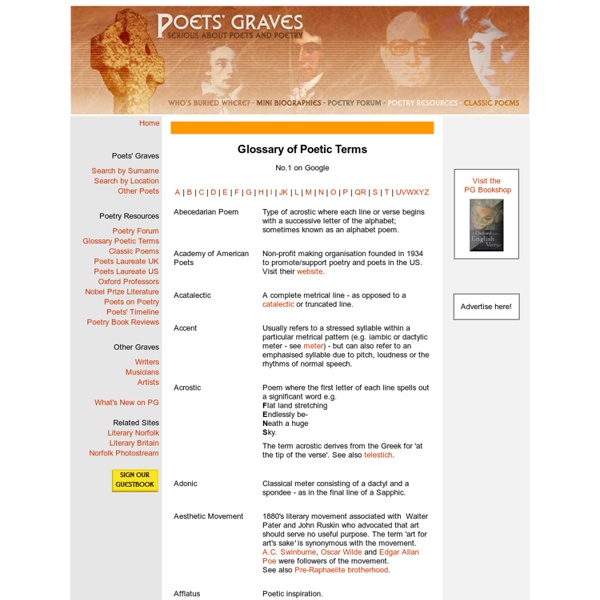Glossary of Poetic Terms
Where a poem makes reference to another poem or text. For example, the 14th line of The Prelude by William Wordsworth 'The earth was all before me' alludes to one of the final lines of Paradise Lost by John Milton 'The world was all before them'. Paradise Lost, in turn, alludes to the story of Adam and Eve in Genesis. A poem containing multiple allusions is The Waste Land by T.S.Eliot which makes reference to lines written by Shakespeare, Milton, Spenser, Verlaine, Baudelaire, Marvell, Dante, Webster, St. Augustine, Goldsmith, Ovid etc. Allusion should not be confused with plagiarism.See also intertextuality.
Poets.org - Poetry, Poems, Bios & More
PoemHunter.Com - Thousands of poems and poets. Poetry Search Engine
The Sonnets
You can buy the Arden text of these sonnets from the Amazon.com online bookstore: Shakespeare's Sonnets (Arden Shakespeare: Third Series) I. FROM fairest creatures we desire increase,II.
Poetry 180: A Poem a Day for American High Schools (Poetry and Literature Center, Library of Congress)
Welcome to Poetry 180. Poetry can and should be an important part of our daily lives. Poems can inspire and make us think about what it means to be a member of the human race. Poetry 180 is designed to make it easy for students to hear or read a poem on each of the 180 days of the school year. Listening to poetry can encourage students and other learners to become members of the circle of readers for whom poetry is a vital source of pleasure. Billy Collins Former Poet Laureate of the United States Learn more about Billy Collins More Poet Laureate projects
Teaching Sonnets Unit Plan
Many educators have found that the sonnets are a wonderful way to introduce Shakespeare to students because the smaller blocks of language are less intimidating than whole plays. Louisa Newlin, who leads workshops on sonnets for teachers, and Gigi Bradford, who teaches Shakespeare’s Sisters, a seminar for high school students at the Folger, have created a series of lesson plans about the sonnets that concentrate on the Bard but also include sonnets from before Shakespeare as well as contemporary sonnets. This arc of study provides a context for Shakespeare’s genius, introduces the sonnet’s form and structure, includes language easier to understand than Shakespeare’s, and illustrates his continuing influence. It’s both a lot of fun and a good way to show that sonnets are ways of thinking, not just love poems in archaic language. The unit contains: Lesson 1: Easing into Shakespeare with a Modern Sonnet Lesson 2: Petrarch, Father of the Sonnet Lesson 3: The English Sonnet: Michael Drayton
AP Poetry Terms
AP English Poetry Terms (Presented by Dennis Carroll of High Point University at AP Workshop) Listed and defined below are literary terms that you will need to know in order to discuss and write about works of poetry. You are already familiar with many of these. l. alliteration- the repetition of identical or similar consonant sounds, normally at the beginnings of words. 2. allusion- a reference in a work of literature to something outside the work, especially to a well-known historical or literary event, person, or work. 3. antithesis- a figure of speech characterized by strongly contrasting words, clauses, sentences, or ideas, as in “Man proposes; God disposes.” 4. apostrophe- a figure of speech in which someone (usually, but not always absent), some abstract quality, or a nonexistent personage is directly addressed as though present. Milton! 5. assonance- the repetition of identical or similar vowel sounds. 7. blank verse- unrhymed iambic pentameter. Irks care the crop-full bird?
Related:
Related:



